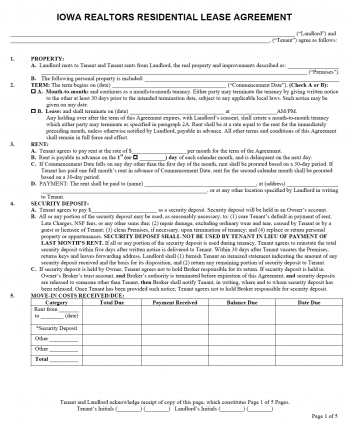
The Iowa Rental Lease Agreements are formed between property owners/managers and tenants for the purpose of locking in the tenant’s obligation to pay rent for a set time. Without rental agreements, landlords would be at constant risk for tenants moving out, which would make planning and budgeting significantly more difficult. Additionally, rental contracts allow landlords to set binding rules regarding the property, helping to ensure rent is paid on time and the units are kept from damage.

Association of Realtors Residential Lease Agreement – A document created by the Iowa Association of Realtors that can be used as either a standard one (1) year lease or as a non-terminating month-to-month contract.
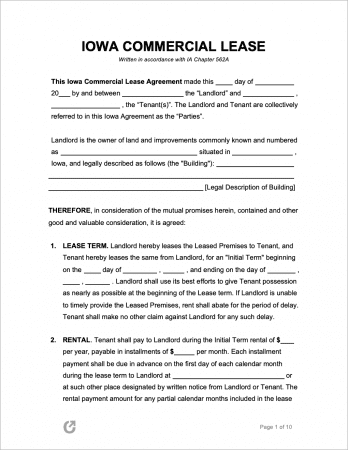
Commercial Lease Agreement – Outlines the rights and responsibilities of a landlord leasing a property to a business owner for one (1) to five (5) years.
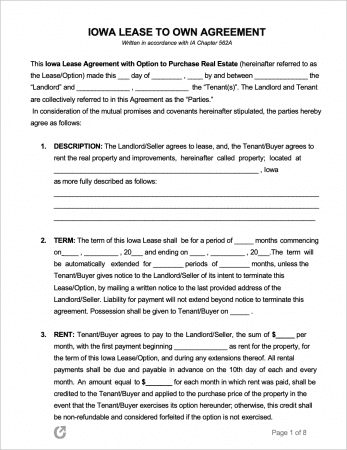
Lease to Own Agreement – A special type of lease agreement that combines elements from purchase agreements and standard leases. Gives tenants the option to purchase a rental property upon the lease’s expiration.
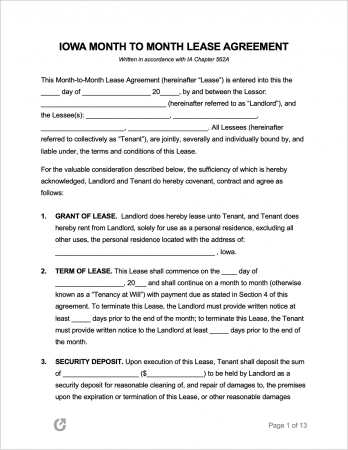
Month-to-Month Rental Agreement – Used by landlords that don’t want to (or cannot) lease a property for one (1) year. An ongoing agreement that can be canceled with notice of only thirty (30) days by either party.
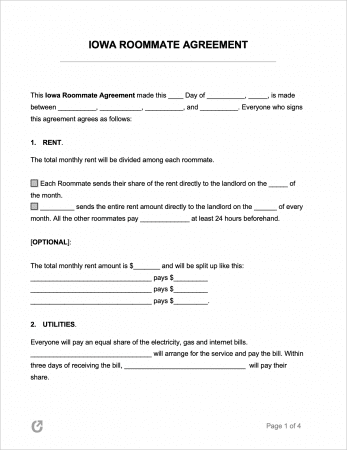
Roommate Agreement – Contains topics relating to day-to-day living among roommates sharing the same rental property.
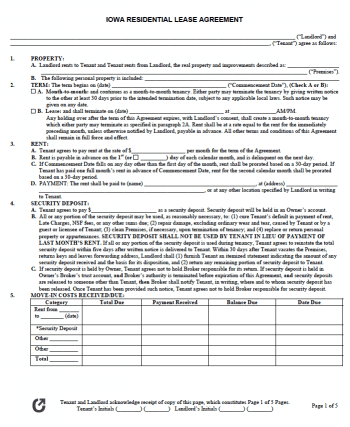
Standard Residential Lease Agreement – Used for leasing rental dwellings on a year-to-year basis. Complies with all Iowa landlord-tenant laws.
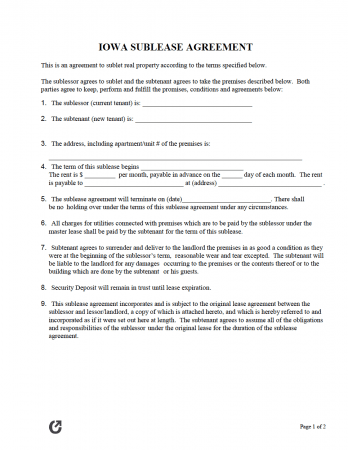
Sublease Agreement – So long the landlord permits it, a tenant can use the form to rent out a leased property for all (or a portion of) of the lease.
An Iowa Lease Agreement is a legally binding contract used by property managers and real estate owners for the purpose of forming rules and responsibilities regarding the renting. Once a landlord finds a tenant to lease their property, they should use a rental application to ensure the tenant has had positive renting experiences and has a history of making timely payments.
Landlord-Tenant Guides / Handbooks
Per § 562A.9(3), unless there are terms to the contrary in the lease, rent will need to be paid in equal monthly installments at the start of every month. For terms of one (1) month or less, rent is payable at the beginning of the lease term. There is no state statute governing grace periods.
Emergencies (§ 562A.19 A(2)): So long the situation is an emergency, landlords can enter occupied units without notice.
Non-Emergency (§ 562A.19 A(3)): Unless it is impractical to do so, landlords must give tenants one (1) days’ notice of their intent to enter. Entrance may only be made at reasonable times (standard business hours).
In accordance with § 562A.15, landlords are required to uphold the following:
Section 562A.17 states tenants have the following obligations (not including those found in the lease agreement):
Maximum (§ 562A.12(1)): The maximum deposit a landlord may demand is two months’ rent.
Returning to Tenant (§ 562A.12(3)(a)): Landlords are required to give back the security deposit within thirty (30) days from the date the tenancy is terminated. If for any reason the landlord will not return the full deposit, they must explain their reasoning to the tenant in a written statement.
Deposit Interest (§ 562A.12(2)): For the first five (5) years of a tenancy, the landlord can keep all interest generated from security deposits. After that time, it must be paid to the tenant.
Uses of the Deposit (§ 562A.12(3a)): Landlords can apply security deposits towards the following: